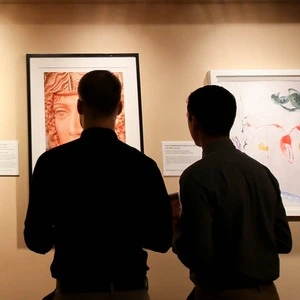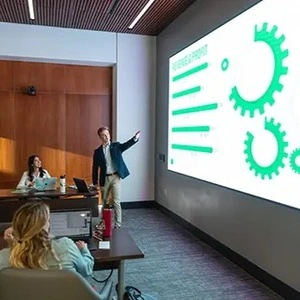
Enroll Anytime Education and Human Development Courses
Course Titles
COMM 360: Communicating Science
This class is designed for upper-division students in the physical, biological, social, health and engineering sciences interested in science communication. It combines findings from research into information processing with best practices in media production to build student competency in communicating about science, scientific discoveries and the scientific process to general audiences through various media, as well as more specific audiences, such as funding organizations and policymakers.
COMM 380: Health Communication
Explores health communication theories and practices across interpersonal, organizational, and mass/digital media contexts.
COUN 536: Medical & Psychosocial Aspects of Disabilities
Note: This is a Graduate course. Focuses on medical and psychosocial information relevant to chronic illnesses and disabilities in clinical rehabilitation counseling. Covers functional implications, medical terminology, treatment procedures, and vocational impacts of various conditions.
COUN 539: Case Management and Community Partnership in Rehabilitation
Note: This is a Graduate course.Covers individualized case and caseload management for individuals with disabilities. Emphasizes community resources and systems across public and private sectors.
EFR 509: Introduction to Applied Educational Research
Note: This is a Graduate course. Introduces quantitative and qualitative research methods in education. Focuses on comparing paradigms and practical applications.
EFR 515: Statistics I
Note: This is a Graduate course. Covers descriptive and inferential statistics through two-way ANOVA. Emphasizes foundational statistical skills.
KIN 242: Introduction to Kinesiology
Provides an overview of kinesiology fields, including career preparation and foundational knowledge.
KIN 305: Health/Physical Education for Early Childhood and Elementary Education Teachers
This course provides background information and skills for the early childhood and elementary teacher to implement coordinated health education in the elementary grades and how to provide support and effective instruction in elementary physical education.
KIN 401: Sport Sociology
Examines the societal role of sport in American culture with interdisciplinary perspectives.
KIN 404: Adapted Physical Activity
Focuses on physical activity for individuals with disabilities across the lifespan. Emphasizes inclusive programming in schools and communities.
KIN 440: Sport Psychology
Analyzes psychological factors that affect sport and exercise behavior.
N&D 240: Fundamentals of Nutrition
Introduces the science of nutrition, including nutrients, health behaviors, and current nutrition issues.
OT 200: Introduction to Occupational Therapy
Presents the history, goals, and professional functions of occupational therapy.
PHE 101: Introduction to Public Health
Introduction to the population health approach to public health. Principles of evidence-based public health and tools for implementation including health communications and informatics, applications of social and behavioral sciences, and health policy, law and ethics. Methods for addressing non-communicable diseases, communicable disease and environmental diseases and injury. An overview of the U.S. health care system and comparisons with health care systems in other developed countries. Examination of public health institutions and systems at the local/state, federal and global levels as well as future issue in public health.
PHE 102: Epidemiology in Public Health
This course covers applications of epidemiologic methods and procedures to the study of the distribution and factors influencing health and diseases, morbidity, injuries, disability, and mortality in populations. Epidemiologic methods for the control of conditions such as infectious and chronic diseases, mental disorders, community and environmental health hazards, and unintentional injuries are discussed. Other topics include quantitative aspects of epidemiology, for example, data sources, measures of morbidity and mortality, evaluation of association and causality, and study design.
PHE 103: Introduction to Global Health
The purpose of this course is to provide the students with the basic knowledge of health indicators, major determinants, and trends of global health.
PHE 301: Principles and Foundation of Health Education
The purpose of this course is to provide the students the historical perspectives of health and health education; professional issues and ethics; credentialing; principles, practices, theoretical frameworks, and foundations of health education.
PHE 306: Epidemiology and Biostatistics
An introduction to epidemiology and biostatistics in public health.
TL 252: Child Development
Studies developmental milestones through adolescence and explores strategies to meet children’s needs in home and community settings.
TL 320: Infant and Toddler
Focuses on development from birth to age 3, with emphasis on supporting growth in home and community environments.
TL 338: Home, School and Community Relations
Explores strategies for building strong partnerships among educators, families, and communities.
TL 526: Play in Development and Early Childhood Education
Note: This is a Graduate course. Examines how play supports development and learning in early childhood. Emphasizes assessment and developmentally appropriate practices.
TL 553: Collaborative Relationships: Home, School and Community
Note: This is a Graduate course. Analyzes how cultural debates influence literacy education. Explores controversial literature and media used in schools, with attention to historical and societal contexts.
Find Your Self-Paced Enroll Anytime Course
Why Take Online Classes at UND?
Here are a few reasons why you should take an online enroll anytime course at UND:
- Great customer service – Our registration team is ready to answer questions quickly so you can focus on your coursework.
- Affordable – UND's enroll anytime courses are priced at North Dakota's affordable, in-state tuition rate.
- Accredited – UND is accredited by the Higher Learning Commission.
- Easily transfer credits – Transferring credits is always at the discretion of the institution to which the credits are being transferred. In general, credits from schools/universities that are regionally accredited by the Higher Learning Commission transfer to other regionally accredited institutions. UND's online courses appear on your UND transcript in the same way as other courses.
Flexible 100% Online Course
You'll take this online course at your own pace. Some students thrive in this environment, while other students may struggle with setting their own deadlines. If you have successfully taken an independent study or correspondence course previously, UND’s enroll anytime courses may be right for you. Still not sure? Take our online quiz to help determine if online enroll anytime courses are right for you.
Course information including tuition, technology requirements, textbooks, lessons and exams is subject to change without notice.
How will the course appear on my transcript?
You may enroll at any time and have up to 9 months to complete this online course.
The credits earned will be recorded on your UND transcript based on the date you registered
for the course. It will appear on your transcript in the same way as a course taken
during a regular semester. There is no indication that the course was taken online
or that you completed it at your own pace.
Consult the table on our How Enroll Anytime Courses Work page for a current listing of Enroll Anytime Registration Dates and the semester
information that will appear on a UND transcript.




